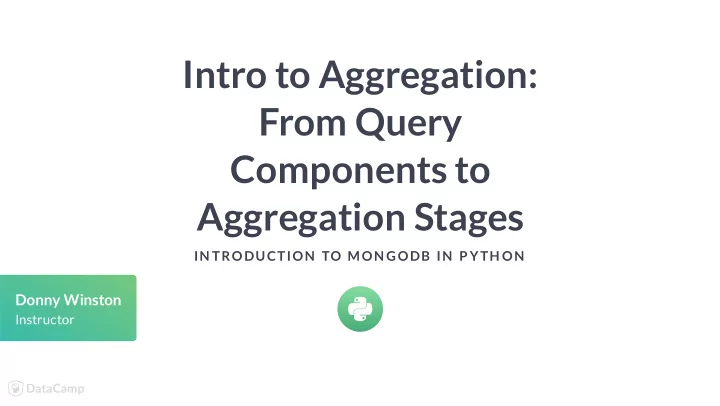

Intro to Aggregation: From Query Components to Aggregation Stages IN TRODUCTION TO MON GODB IN P YTH ON Donny Winston Instructor
Queries have implicit stages cursor = db.laureates.find( cursor = db.laureates.aggregate([ filter={"bornCountry": "USA"}, {"$match": {"bornCountry": "USA"}}, projection={"prizes.year": 1}, {"$project": {"prizes.year": 1}}, limit=3 {"$limit": 3} ) ]) for doc in cursor: for doc in cursor: print(doc["prizes"]) print(doc["prizes"]) [{'year': '1923'}] [{'year': '1923'}] [{'year': '1927'}] [{'year': '1927'}] [{'year': '1936'}] [{'year': '1936'}] cursor = db.laureates.aggregate([ stage_1, stage_2, ... ]) INTRODUCTION TO MONGODB IN PYTHON
Adding sort and skip stages from collections import OrderedDict list(db.laureates.aggregate([ {"$match": {"bornCountry": "USA"}}, {"$project": {"prizes.year": 1, "_id": 0}}, {"$sort": OrderedDict([("prizes.year", 1)])}, {"$skip": 1}, {"$limit": 3} ])) [{'prizes': [{'year': '1912'}]}, {'prizes': [{'year': '1914'}]}, {'prizes': [{'year': '1919'}]}] INTRODUCTION TO MONGODB IN PYTHON
But can I count? list(db.laureates.aggregate([ {"$match": {"bornCountry": "USA"}}, {"$count": "n_USA-born-laureates"} ])) [{'n_USA-born-laureates': 269}] db.laureates.count_documents({"bornCountry": "USA"}) 269 What about db.laureates.distinct("bornCountry") ? INTRODUCTION TO MONGODB IN PYTHON
Let's practice! IN TRODUCTION TO MON GODB IN P YTH ON
Back to Counting: IN TRODUCTION TO MON GODB IN P YTH ON Donny Winston Instructor
Field paths expression object ? db.laureates.aggregate([ {"$project": {"n_prizes": {"$size": "$prizes"}}} {field1: <expression1>, ...} ]).next() db.laureates.aggregate([ {"$project": {"prizes.share": 1}} {'_id': ObjectId('5bd3a610053b1704219e19d4'), ]).next() 'n_prizes': 1} expression: {"$size": "$prizes"} {'_id': ObjectId('5bd3a610053b1704219e19d4'), 'prizes': [{'share': '1'}]} �eld path: $prizes expression: 1 INTRODUCTION TO MONGODB IN PYTHON
Operator expressions db.laureates.aggregate([ {"$project": {"n_prizes": {"$size": "$prizes"}}} ]).next() {'_id': ObjectId('5bd3a610053b1704219e19d4'), 'n_prizes': 1} operator expression: {"$size": "$prizes"} �eld path: $prizes db.laureates.aggregate([ {"$project": {"n_prizes": {"$size": ["$prizes"]}}} ]).next() {'_id': ObjectId('5bd3a610053b1704219e19d4'), 'n_prizes': 1} INTRODUCTION TO MONGODB IN PYTHON
One more example: a multi-parameter operator db.laureates.aggregate([ {"$project": {"solo_winner": {"$in": ["1", "$prizes.share"]}}} ]).next() {'_id': ObjectId('5bd3a610053b1704219e19d4'), 'solo_winner': True} INTRODUCTION TO MONGODB IN PYTHON
Implementing .distinct() list_1 = db.laureates.distinct("bornCountry") list_2 = [doc["_id"] for doc in db.laureates.aggregate([ {"$group": {"_id": "$bornCountry"}} ])] set(list_2) - {None} == set(list_1) True $group must map _id , which must be unique (like any Mongo document) No $match before $group All distinct "bornCountry" values captured including "no value" ( None ) INTRODUCTION TO MONGODB IN PYTHON
How many prizes have been awarded in total? list(db.laureates.aggregate([ {"$project": {"n_prizes": {"$size": "$prizes"}}}, {"$group": {"_id": None, "n_prizes_total": {"$sum": "$n_prizes"}}} ])) [{'_id': None, 'n_prizes_total': 941}] {"_id": None"} ? one document out. $sum operator acts as accumulator in $group stage INTRODUCTION TO MONGODB IN PYTHON
Let's practice! IN TRODUCTION TO MON GODB IN P YTH ON
Zoom into Array Fields with $unwind IN TRODUCTION TO MON GODB IN P YTH ON Donny Winston Instructor
Sizing and summing list(db.prizes.aggregate([ list(db.prizes.aggregate([ {"$project": {"n_laureates": {"$size": "$laureates"}, {"$project": {"n_laureates": {"$size": "$laureates"}, "year": 1, "category": 1, "_id": 0}} "category": 1}}, ])) {"$group": {"_id": "$category", "n_laureates": {"$sum": "$n_laureates"}}}, {"$sort": {"n_laureates": -1}}, [{'year': '2018', 'category': 'physics', 'n_laureates': 3}, ])) {'year': '2018', 'category': 'chemistry', 'n_laureates': 3}, {'year': '2018', 'category': 'medicine', 'n_laureates': 2}, ...] [{'_id': 'medicine', 'n_laureates': 216}, {'_id': 'physics', 'n_laureates': 210}, {'_id': 'chemistry', 'n_laureates': 181}, {'_id': 'peace', 'n_laureates': 133}, {'_id': 'literature', 'n_laureates': 114}, {'_id': 'economics', 'n_laureates': 81}] INTRODUCTION TO MONGODB IN PYTHON
How to $unwind list(db.prizes.aggregate([ {"$unwind": "$laureates"}, {"$project": { "_id": 0, "year": 1, "category": 1, "laureates.surname": 1, "laureates.share": 1}}, {"$limit": 3} ])) [{'year': '2018', 'category': 'physics', 'laureates': {'surname': 'Ashkin', 'share': '2'}}, {'year': '2018', 'category': 'physics', 'laureates': {'surname': 'Mourou', 'share': '4'}}, {'year': '2018', 'category': 'physics', 'laureates': {'surname': 'Strickland', 'share': '4'}}] INTRODUCTION TO MONGODB IN PYTHON
Renormalization, anyone? list(db.prizes.aggregate([ {"$unwind": "$laureates"}, {"$project": {"year": 1, "category": 1, "laureates.id": 1}}, {"$group": {"_id": {"$concat": ["$category", ":", "$year"]}, "laureate_ids": {"$addToSet": "$laureates.id"}}}, {"$limit": 5} ])) [{'_id': 'medicine:1901', 'laureate_ids': ['293']}, {'_id': 'peace:1902', 'laureate_ids': ['465', '464']}, {'_id': 'physics:1902', 'laureate_ids': ['3', '2']}, {'_id': 'peace:1903', 'laureate_ids': ['466']}, {'_id': 'medicine:1903', 'laureate_ids': ['295']}] INTRODUCTION TO MONGODB IN PYTHON
$unwind and count 'em, one by one list(db.prizes.aggregate([ {"$project": {"n_laureates": {"$size": "$laureates"}, "category": 1}}, {"$group": {"_id": "$category", "n_laureates": {"$sum": "$n_laureates"}}}, {"$sort": {"n_laureates": -1}}, ])) list(db.prizes.aggregate([ {"$unwind": "$laureates"}, {"$group": {"_id": "$category", "n_laureates": {"$sum": 1}}}, {"$sort": {"n_laureates": -1}}, ])) [{'_id': 'medicine', 'n_laureates': 216}, {'_id': 'physics', 'n_laureates': 210}, {'_id': 'chemistry', 'n_laureates': 181}, {'_id': 'peace', 'n_laureates': 133}, {'_id': 'literature', 'n_laureates': 114}, {'_id': 'economics', 'n_laureates': 81}] INTRODUCTION TO MONGODB IN PYTHON
$lookup list(db.prizes.aggregate([ bornCountries = db.laureates.distinct( {"$match": {"category": "economics"}}, "bornCountry", {"prizes.category": "economics"}) {"$unwind": "$laureates"}, assert set(bornCountries) == set(agg[0]['bornCountries']) {"$lookup": {"from": "laureates", "foreignField": "id", "localField": "laureates.id", "as": "laureate_bios" {"$unwind": "$laureate_bios"}, {"$group": {"_id": None, "bornCountries": {"$addToSet": "$laureate_bios.bornCountry"} }}, ])) [{'_id': None, 'bornCountries': [ 'the Netherlands', 'British West Indies (now Saint Lucia)', 'Ita 'Germany (now Poland)', 'Hungary', 'Austria', 'India', 'USA', 'Canada', 'British Mandate of Palestine (now Israel)', 'Norway', 'Russian Empire (now Russia)', 'Russia', 'Finland', 'Scotland', 'France', 'Sweden', 'Germany', 'Russian Empire (now Belarus)', 'United Kingdom', 'Cyprus' ]}] INTRODUCTION TO MONGODB IN PYTHON
Time to unwind... with exercises! IN TRODUCTION TO MON GODB IN P YTH ON
Something Extra: $addFields to Aid Analysis IN TRODUCTION TO MON GODB IN P YTH ON Donny Winston Instructor
Recommend
More recommend